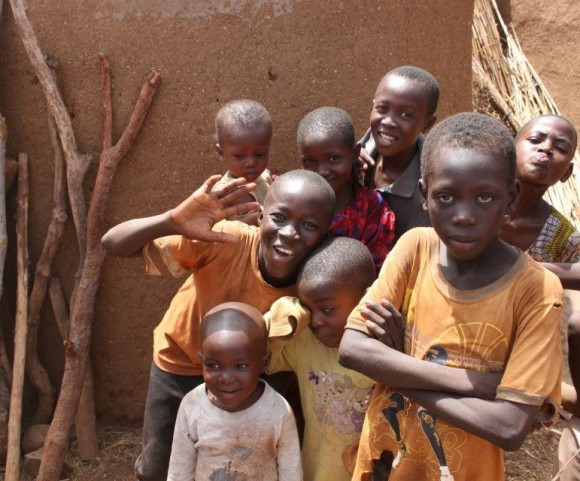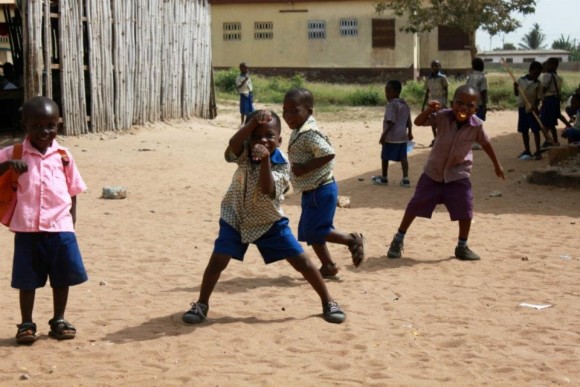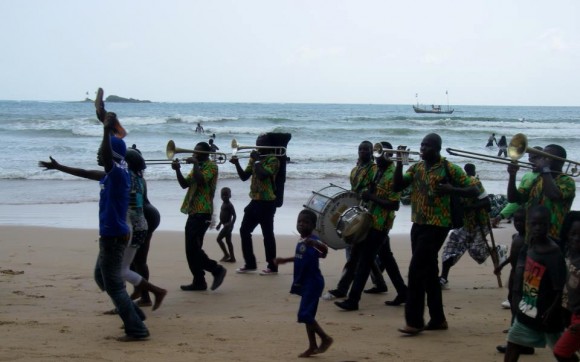If a week is a long time in politics, how long is 10 years in development? Back in 2010, Government and development partners agreed that Ghana should be aiming to no longer need aid by 2020. In the last few weeks we've been thinking about how realistic that is, and what we need to do to get there.
My short view is that there's still some way to go. However, it's important not to lose sight of the remarkable progress Ghana has made in recent years; a reduction from 52% of people living below the poverty line in 1991 to 29% in 2006 (the most recent year for which the numbers are available). That means there are millions of people whose lives are significantly better than their parents. But it also means there are still millions who live on less than $1.25 a day.
What might need to happen between now and 2020 for Ghana not to need aid? Whilst the economy continues to grow rapidly (14.4% in 2011), it's crucial that human development indicators (performance in health, education and so on) keep pace with the impressive economic statistics. Ghana's success at lifting people out of poverty has also primarily been the success of the south of the country. A huge 69% of the population in the three northern regions of Ghana still live in poverty (see some of my previous blogs on our programmes in the north here and here.)

It’s difficult, then, to imagine a Ghana free from aid without reducing the inequality between the north and the south. Ultimately, people need to feel on an individual level that they are benefitting from a country's economic growth, otherwise they have no interest in trying to sustain it; growing inequality would surely create discontent further down the line.
Whilst Ghana has made great progress in, for example, increasing the number of children in primary school, in terms of education outcomes (what children actually learn) there's still some way to go. (Watch a brilliant TED talk from a Ghanaian on the importance of education here.)

Translating the economic growth into large numbers of jobs for people will be crucial. The size of the formal sector – the number of medium size businesses, the number of people in jobs where they actually get paid, rather than, for example, subsistence farming – will need to increase rapidly, and Ghana will continue to need to look beyond natural resources to other means of creating income.
If Ghana is to stop needing aid, I also think continuing to reform the public sector will be critical. Well-functioning state institutions are crucial for any country seeking to improve the lives of its citizens. Whether through technical assistance, institutional strengthening, changing incentives - the real challenge is how to achieve this reform. I think mobilising communities and encouraging citizens to demand accountability from their government will also be crucial as Ghana looked to a future without aid.
There are no easy answers, but the fact that we’re starting to think about the questions – what does Ghana need for a future without aid – is surely a positive thing.


4 comments
Comment by Natalie Reid posted on
I have just returned from Ghana 4 weeks now. I was there doing volunteer work through charity called Thrive Africa. We did many different projects and one was working in Kumasi children's home. While there I was shocked to see two young kids with disabilities basically left to defend for themselves, one of the kids had a severe eye infection that was making him go blind and the other one his leg muscles had wasted away and dragged himself around using his upper body.
We did not see any attention at all being giving to those boys, every other child had uniforms on and attended class for education while the two boys where left outside on the steps. This has affected myself and others who where with me.
Just like to ask is there anything we can do to make awareness of this situation?
Comment by Heri Muhero posted on
Habari (greetings) Henri. I found your blog after visiting the Global Poverty Project website. The title of your recent post "Ghana: A Future Without Aid?" caught my attention because it seems to infer that African nations are inherently incapable of development without foreign (i.e. western) assistance.
As a confident, optimistic, and hopeful African, I would have titled a similar article as "Ghana: A Bright Future Without Aid!". Exclamation point instead of question mark. Western audiences tend to have a bleak view about Africa and her prospects for future prosperity. If all foreign aid stopped being provided to Ghana (for example), the country and her citizenry would continue to exist. Contrary to western opinion, Ghana would not disappear into some failed-state, cosmic vacuum.
Does foreign aid make a difference in the lives of many ordinary Africans? Most definitely. However, this should not be interpreted as validation that African communities are inherently incapable of improving their own standards of living. Foreign assistance can make a difference, but it is not the only way forward. Progress is possible even without it.
I wanted to share an alternative/African perspective. Peace and blessings.
Comment by Henr Donati posted on
Hi Natalie and Heri - thanks for your comments.
Natalie - your story sounds distressing. In Ghana and other developing countries, people with disabilities can often be treated in ways we do not find acceptable. The Paralympics just finished in the UK, and sent a positive message of the abilities and potential of disabled people around the world. The 'Right to Dream' academy in Ghana trained a 4 person team which went to the paralympic games - hopefully a first step in changing perceptions about disabilites here in Ghana.
I know other organisations like Voice Ghana advocate for people with disabilities in Ghana, and it may be worth getting in touch with them. http://voiceghana.org/home.html They have previously been supported by STAR Ghana - a fund supported by DFID Ghana which seeks to improve the accountability and responsiveness of Ghana's Government and traditional authorities, including on issues like disability.
Heri - thanks for reading my blog. You're absolutely right - of course countries like Ghana would continue to exist and indeed flourish without aid - like your comment, I had thought the tone of my article was positive about Ghana's future - saying in a short time Ghana would no longer need aid.
My blog talks about all the positive things Ghana has achieved in recent years (record economic growth, reduction in poverty) and does not intend to give aid the credit for achieving these things. The crucial thing, as I think I say in my last paragraph, is the relationships between citizens and government - it is Ghana's government and most of all its people who have achieved all these things, and it will ultimately be the interaction between these two which determines Ghana's future. Aid at most can only survive to facilitate this process.
Comment by andy brookes posted on
I like the words accountability; in a recent email reply from DFID of 90 Million per year aid, half of this is going to directly into the Governments coffers.
I hate to be cynical but the level of dis-honesty encountered was tiresome while in Ghana. I once went to the Ministries in Accra and managed to get a meeting with the ICT co-coordinator for the Ministry of Education, where I was promoting Linux as a tool for education using gCcompris etc.
I mentioned the endemic cloning of Windows,and asked if the Government were going to do anything about it. (In Indonesia they raided internet cafes and closed them down if using cloned I.e stolen software) I have never met somebody so slippery as that guy!
As things get tighter in the UK the focus will be about where and how our money is spent; this is where DFID should come in and verify what Ghana is doing with the money. Once they have verified where it goes, then show it on the web site. I expect to see schools built, with nice new computers with kids using them. If you look at DFID web site
http://www.dfid.gov.uk/Where-we-work/Africa-West--Central/Ghana/
, its less then convincing- a few kids faces saying this is who we have helped. Thats it for 90 Million a year , you got to be kidding! Worse when you make an enquiry to DFID , the incite into how DFID thinks and does things is more worrying. They send answers in doc attachments ,yet when the attachment itself when opened sates “this is a web archive” .Either they are going about things the hard way or need some ICT training.
If you are trying to get a Country to move on infrastructure must be one of your priories! In 2005 I went by coach from Accra to Adum, in Kumasi; the road was just hard core. IN 2011 I made the same journey, I couldn’t believe a large stretch was still hardcore.